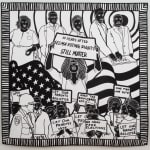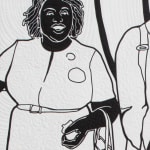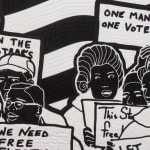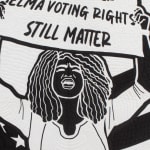Carolyn Mazloomi
Further images
The fight for voting rights by Black people has been a crucial aspect of the broader Civil Rights Movement in the United States, spanning from the Reconstruction era through the 20th century and beyond. In the 1950s and 1960s, the Civil Rights Movement gained momentum. Key figures like Martin Luther King Jr. and organizations like the Student Nonviolent Coordinating Committee organized protests and voter registration drives, particularly in the South. In 1965, the march from Selma to Montgomery highlighted the struggle for voting rights. The violent response from authorities during the march, known as “Bloody Sunday,” garnered national attention and outrage. As a result of the march, the Voting Rights Act of 1965 was passed. This landmark legislation aimed to eliminate barriers to voting for African Americans. It prohibited discriminatory practices and provided for federal oversight of voter registration in areas with a history of discrimination.
My family and I watched the televised news of events surrounding the march. We watched as the workers were beaten. I recall looking at a young John Lewis getting beaten with a baton and a police dog attacking him. It is my love and respect for the Civil Rights workers that inspired me to make this quilt. I made it for people who were willing to give their lives for the right of Black people to vote. At the top of the quilt, you see images of Fannie Lou Hamer, John Lewis, Ella Baker, Medgar Evers and Dr. Martin Luther King voting. All were giants in the Civil Rights Movement. Young protesters from the 1960s are carrying signs demanding their parents be given the right to vote. The young girl in the center of the quilt is a reflection of the state of voting rights today. It’s been 59 years since the Voting Rights Act of 1965 was passed, however minorities still have problems voting.
Despite the law, challenges to voting rights persist. Voter ID laws, purging of voter rolls, limited access to polling places, gerrymandering, felon disenfranchisement, lack of voter education and other restrictive measures continue to disproportionately affect Black voters. Advocacy and activism remain crucial in the ongoing fight for equitable access to the ballot. Fifty-nine years later, the proposed John Lewis Voting Rights Advancement Act, a piece of legislation aimed at protecting and expanding voting rights in the United States, has not been passed by Congress.
Join our mailing list
* denotes required fields
We will process the personal data you have supplied in accordance with our privacy policy (available on request). You can unsubscribe or change your preferences at any time by clicking the link in our emails.










